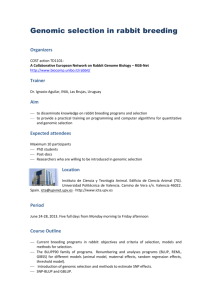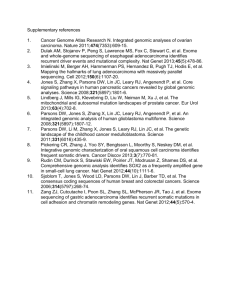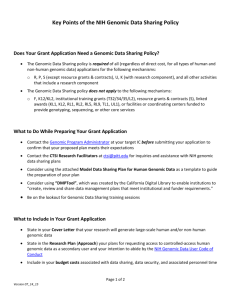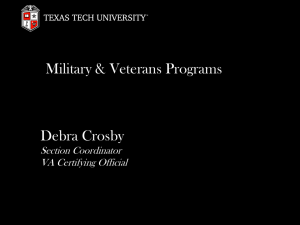Biorepository presentation - Boston VA Research Institute, Inc.
advertisement
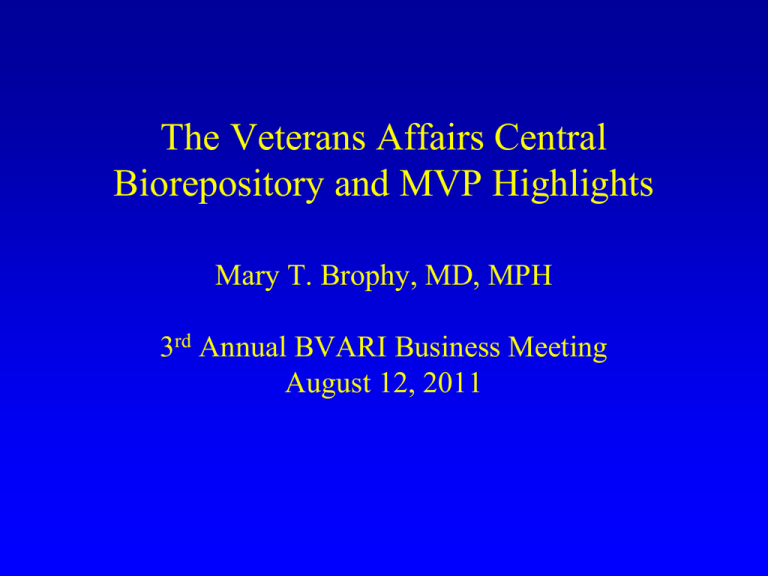
The Veterans Affairs Central Biorepository and MVP Highlights Mary T. Brophy, MD, MPH 3rd Annual BVARI Business Meeting August 12, 2011 Personalized Medicine Emerging genomic technologies are critically dependent upon: well validated clinical data linked to high quality biospecimens “Health-care systems spend billions of dollars annually on biomarker research for personalized medicine. Success hinges on the quality of the biobank specimens and the data used to derive them, but a lack of quality control is polluting the scientific literature with flawed information that will take a long time to sort out.” “Leading journals are trend setter when it comes to defining publication criteria ……To uphold standards, all journals should insist on full details of biobanked specimens ” Simeon-Dubach, Perren A. Nature 457:454-455, July 2011 Rationale for VA Central Biorepository • Program wide effort to standardize the methods for research using biospecimens in VA studies • Goals – To ensure the highest level of human protection – Maximize the scientific value of the bank VA Central Biorepository • Located at the Boston VA • Serves as a central biobank for VA studies • De-identified samples stored in a state of the art biorepository – ISBER and NCI guidelines for biorepositories • Assurance of the quality of the specimen and longevity of bank beyond the study VA Central Biorepository Operations • Developed standard operating procedures for biosample collection, processing and storage that could be used across studies • Meeting the study specific needs – – – – Types of biospecimens Specialized collection techniques Local or central processing Storage and analytic needs Million Veteran Program (MVP): A Partnership with Veterans Million Veteran Program: A Partnership With Veterans Million Veteran Program • MVP is a major research initiative that will create a longitudinal cohort of one million users of the VA Healthcare System to study genes and health • Designed to provide a better understanding of how genes affect health and illness • Goal of improving health care for Veterans and the nation MVP Background • 2006 – Genomic Medicine Program (GMP) • Genomic Medicine Advisory Panel comprised of private and public health, scientific, legal experts in field of genetics was established by the Secretary • 2007 to 2008 – Consultation project to assess veterans’ knowledge and attitudes about genomic medicine • Kathy Hudson, Genetics in Medicine; May 2008 • Study 931 participants • 83% said program should be developed; • 71% said they would participate Genomic Medicine Protocol • 2009 – Protocol planning and development – Consent allows for open-ended access to medical records, VA and non-VA databases – HIPPA authorization for use of personal health information – Biospecimens (blood, tissues, salvia) stored for use in future studies any disease – Samples and information may be made available to VA and other researcher • Approved by VA oversight committees – Participants may be re-contacted in the future • Participation in new research studies MVP Protocol • 2010 –Protocol approved by VA Central IRB – Enroll one million veterans over 5 to 7 years – Centralized recruitment – Study visits at VA Medical Centers • • • • In person informed consent and HIPPA authorization Baseline questionnaire Blood sample -10ml ETDA tube Optional lifestyle questionnaire – Information Security • Unique codes to identify data and specimen • GenISIS computing environment Sample Processing Automated Blood Fractionation Automated DNA Extraction • High-throughput DNA Extraction Freezer Space Current freezer storage Additional Freezer Space Future freezer storage MVP Governance and Oversight • Genomic Medicine Advisory Panel • VA Central IRB • Genomic Cooperative Studies Scientific Evaluation Committee • VA Genomic Medicine Program • MVP Executive Committee Summary • The Million Veteran Program is a major, new research initiative to create one of the largest databases of genomic, military exposure, lifestyle and health information • Collaborative effort of the VA research and clinical infrastructure • Iterative process to assure participation nationally, optimize processes for recruitment, data/specimen collection storage access and analysis • Ultimate goal of integration of the emerging genomic technologies in to the clinical healthcare system


